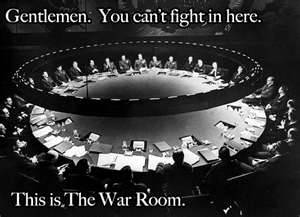OCCUPY THE PENTAGON – NOT WALL STREET
George F. Kennan lived a lucid 100 years and one of his books written in the 1950’s, “Realities of American Foreign Policy,” I carried with me in my travels through Europe and Africa. With his wisdom tucked under my arm, I could make sense of the world. He was a man with a remarkable talent for conveying complex ideas with clear, readable arguments. His thoughts laid the ground work for the Truman Doctrine after World War II and the policy of containment which was a peaceful means of thwarting Soviet dreams of empire.

(Courtesy: www.hotmoviesale.com)
I admit, at the time of the late 1950s and early 60s, I was young and frightened by a world on the brink of a nuclear war. Hollywood seemed to be scared, too, making films on the subject like “On the Beach” (1959) and “Dr. Strangeglove or: How I Learned to Stop Worrying and Love the Bomb.” (1964). In those days, Kennan’s insights helped design a foreign policy that offered hope. But he uttered warnings, too. What worried him was that our fear would lead us to a military build-up which could turn against us. Dwight Eisenhower gave us a similar warning about the industrial military complex on the day he left the presidency.
Recently, the writer Tod Purdum had the privilege of reading through many of Kennan’s private and public papers. Sadly, his conclusion about Kennan’s later work was that the man had begun to lose hope about the course of our nation:
“Kennan reflected on a topic that had become something of an obsession for him by his 80th year: the ‘phenomenon that had had a profoundly distorting effect on the entire economy. Military spending had become a national addiction. We could not now break ourselves of this habit… without the most serious of withdrawal symptoms.’” (“Vanity Fair,” “One Nation under Arms,” by Tod Purdum, January 2012, pg. 76)
Right now we Americans are focused on Wall Street and the financial system that is laced with problems obvious to many. But consider the ever-growing military budget which a few “brave” politicians have tried to trim with no greater effect than pulling one hair from an abundant beard. Purdum, like Eisenhower and Kennan would have us look at where the real money flows: (Purdum, pg. 77)
“Great corporate engines once worked to build the U. S. civil economy and the infrastructure that underlay it; now they are at the service of military power and its projection abroad.” (Purdum, pg. 77)
According to his statistics, our military spending accounts for 43% of all defense spending in the world: Six times more than China and 12 times more than Russia, for example (Purdum, pg. 76). If true, then the next time we want to stage a sit-in, perhaps it should be at the Pentagon and at the corporate offices of defense contractors. They gobble up the taxpayer’s dollars at a rate that makes the bank fiasco look like small change.